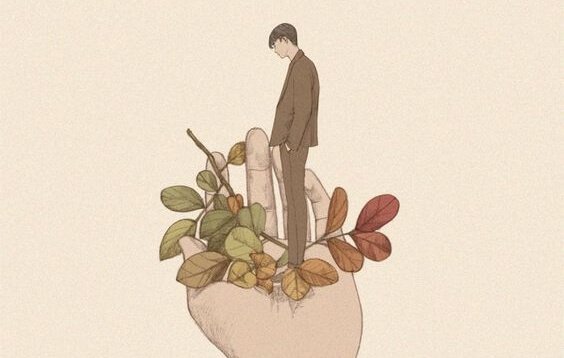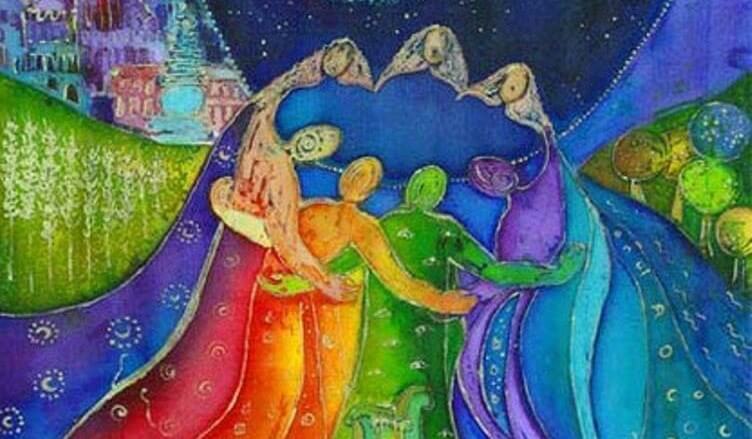Dignity is What Tells Us We Deserve Better

Every living person is important and valuable, and this value has a name: dignity. It is an inherent quality that reminds us that no one has the right to use us. It tells us that we are free, valuable creatures, responsible for our own lives and deserving of respect.
Dignity is one of the most interesting yet neglected concepts when it comes to personal growth. Somehow we have forgotten that this dimension does not depend on external recognition. We don’t need others to give us value or feel worthy.
“Work in such a way that you use humanity, both yours and other people’s, always with a purpose and never merely as a means”
-Immanuel Kant-
Dignity is a quality inherent in all of us. As Martin Luther King once said, no matter what your job, no matter the color of your skin or how much money you have in your bank account, we are all worthy of respect, and we all have the capacity to build a much better world if we accept ourselves and one another.
However, dignity and vulnerability always go hand-in-hand. This innate quality depends directly on our emotional balance and self-esteem. Sometimes all it takes is for someone to want to hurt us for us to feel unworthy of love. Even being unemployed can make us think that we’re useless.
Come dive into the concept of dignity with us…

What dignity isn’t
Knowing that we deserve the best, that we deserve respect for just being who we are, is not pride. Defending our identity, our freedom and our right to have a voice, opinion and values, is not narcissism. Understand that and your sense of identity will be strengthened — and you’ll be happier.
However, the most dangerous part of our psychological health to neglect is our dignity. Let’s remember this very simple piece of advice: hope isn’t actually the most important thing; what we really need to hold on to with both hands is our dignity.
Now let’s talk about what ways we tend to forget or overlook this principle of inner strength.

We lose our dignity when…
Dignity is not like a key we keep in our pocket and sometimes give to others for safekeeping. Dignity is not a material possession. It is a non-transferable, unconditional, individual and private asset that we all have. Never leave it with anyone; never sell it. Keep it with you ALWAYS.
We lose our dignity when we…
- allow ourselves to be systematically humiliated.
- stop loving ourselves.
- become conformists and accept much less than we deserve.
- overstep, demanding privileges and disturbing the harmony we have with our fellow man. This one may seem contradictory, but going to either extreme is harmful to our dignity.
That said, it isn’t a lack of self-confidence and self-esteem that steals our dignity away from us. Sometimes people make themselves unworthy the moment they start to act without any consideration for others, selfish and even abusive.
The 5 pillars of dignity
Dignity is perhaps a subject that has more to do with philosophy than psychology. Kant, for example, defined a person with proper dignity as a person with conscience, self-will and autonomy. However, classic definitions of this term neglect one essential aspect: dignity is also expressed when we make those around us feel respected, worthy and valued.
“Every human being is a person. It is necessary to respect the person as they are, regardless of whether or not they have a conscience”
-Evandro Agazzi-
We are dealing therefore with a personal asset, but also a proactive attitude. It doesn’t matter that we’re born with dignity, like we said at the beginning. We also have to foster environments where dignity prevails, whether in the home, at work, or in our community.
Let’s now see what pillars hold dignity up…

How can I support my dignity?
- First, understand that you are your own master. You direct your own orchestra, you write your own book, you hold the compass of your life. No one should take us where we shouldn’t go and make us unhappy.
- The second pillar is simple yet complicated: giving ourselves permission to get what we want. Often we don’t feel worthy of having good things in our lives. We just accept whatever life has brought us as if we were supporting actors and not the protagonist of our life.
- Third, define your values. Having a strong identity, good self-esteem and firm values puts your dignity on solid ground. Don’t let anyone violate any of these aspects.
- Fourth: self-reflection and meditation. Throughout the day, it’s a good idea to take some time for ourselves. We need a space of our own to look inward and diagnose our own feelings. Our dignity takes a beating in our daily lives, and we’ll need to identify what’s doing it in order to heal our wounds.
- Last but not least, protecting other people’s dignity is also essential. We pointed it out before: having dignity is also recognizing others as our equals, no matter their state, situation, origin, status or race. Let’s learn to build a more just world — beginning with ourselves and our dignity.
Every living person is important and valuable, and this value has a name: dignity. It is an inherent quality that reminds us that no one has the right to use us. It tells us that we are free, valuable creatures, responsible for our own lives and deserving of respect.
Dignity is one of the most interesting yet neglected concepts when it comes to personal growth. Somehow we have forgotten that this dimension does not depend on external recognition. We don’t need others to give us value or feel worthy.
“Work in such a way that you use humanity, both yours and other people’s, always with a purpose and never merely as a means”
-Immanuel Kant-
Dignity is a quality inherent in all of us. As Martin Luther King once said, no matter what your job, no matter the color of your skin or how much money you have in your bank account, we are all worthy of respect, and we all have the capacity to build a much better world if we accept ourselves and one another.
However, dignity and vulnerability always go hand-in-hand. This innate quality depends directly on our emotional balance and self-esteem. Sometimes all it takes is for someone to want to hurt us for us to feel unworthy of love. Even being unemployed can make us think that we’re useless.
Come dive into the concept of dignity with us…

What dignity isn’t
Knowing that we deserve the best, that we deserve respect for just being who we are, is not pride. Defending our identity, our freedom and our right to have a voice, opinion and values, is not narcissism. Understand that and your sense of identity will be strengthened — and you’ll be happier.
However, the most dangerous part of our psychological health to neglect is our dignity. Let’s remember this very simple piece of advice: hope isn’t actually the most important thing; what we really need to hold on to with both hands is our dignity.
Now let’s talk about what ways we tend to forget or overlook this principle of inner strength.

We lose our dignity when…
Dignity is not like a key we keep in our pocket and sometimes give to others for safekeeping. Dignity is not a material possession. It is a non-transferable, unconditional, individual and private asset that we all have. Never leave it with anyone; never sell it. Keep it with you ALWAYS.
We lose our dignity when we…
- allow ourselves to be systematically humiliated.
- stop loving ourselves.
- become conformists and accept much less than we deserve.
- overstep, demanding privileges and disturbing the harmony we have with our fellow man. This one may seem contradictory, but going to either extreme is harmful to our dignity.
That said, it isn’t a lack of self-confidence and self-esteem that steals our dignity away from us. Sometimes people make themselves unworthy the moment they start to act without any consideration for others, selfish and even abusive.
The 5 pillars of dignity
Dignity is perhaps a subject that has more to do with philosophy than psychology. Kant, for example, defined a person with proper dignity as a person with conscience, self-will and autonomy. However, classic definitions of this term neglect one essential aspect: dignity is also expressed when we make those around us feel respected, worthy and valued.
“Every human being is a person. It is necessary to respect the person as they are, regardless of whether or not they have a conscience”
-Evandro Agazzi-
We are dealing therefore with a personal asset, but also a proactive attitude. It doesn’t matter that we’re born with dignity, like we said at the beginning. We also have to foster environments where dignity prevails, whether in the home, at work, or in our community.
Let’s now see what pillars hold dignity up…

How can I support my dignity?
- First, understand that you are your own master. You direct your own orchestra, you write your own book, you hold the compass of your life. No one should take us where we shouldn’t go and make us unhappy.
- The second pillar is simple yet complicated: giving ourselves permission to get what we want. Often we don’t feel worthy of having good things in our lives. We just accept whatever life has brought us as if we were supporting actors and not the protagonist of our life.
- Third, define your values. Having a strong identity, good self-esteem and firm values puts your dignity on solid ground. Don’t let anyone violate any of these aspects.
- Fourth: self-reflection and meditation. Throughout the day, it’s a good idea to take some time for ourselves. We need a space of our own to look inward and diagnose our own feelings. Our dignity takes a beating in our daily lives, and we’ll need to identify what’s doing it in order to heal our wounds.
- Last but not least, protecting other people’s dignity is also essential. We pointed it out before: having dignity is also recognizing others as our equals, no matter their state, situation, origin, status or race. Let’s learn to build a more just world — beginning with ourselves and our dignity.
This text is provided for informational purposes only and does not replace consultation with a professional. If in doubt, consult your specialist.







